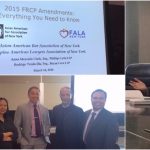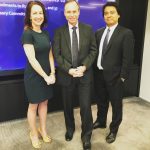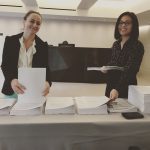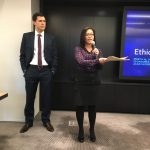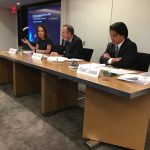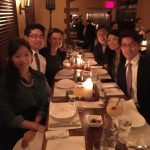FOR IMMEDIATE RELEASE
MEDIA CONTACT:
Tony Cao, Office of Assemblyman Ron Kim
618-559-9672 | tony@ronkim.com
Flushing, New York –
On Monday, March 28, 2016, Assemblyman Ron Kim joined community leaders
at the NYC Bar Association to participate at a forum to bring the Asian
and Black communities together. Instead of just watching the recent
Peter Liang case pit communities of color against each other,
Assemblyman Ron Kim helped organize Monday’s forum to steer the Black
and Asian communities toward collaboration based on shared values.
Here is Assemblyman Ron Kim’s full speech:
“My
job as a public servant allows me to interact with hundreds of
constituents, sometimes thousands every week. The district I represent
is predominantly Asian, and as a result I have a deep understanding of
the hardships and obstacles that many Asian Americans face, whether they
are recent immigrants or natural born citizens.
I’m
participating today at this forum because I want to dispel a couple of
Asian stereotypes that are a result of racism, but more importantly,
further compound and promulgate institutional racism in the form of
applying double standards to, and scapegoating of Asian Americans by our
government and judicial systems.
First,
there is no such thing as ‘Asian privilege’ in this country. Asians do
not have it easier than other minority groups. We are denied access to
opportunities, face obstacles for upward mobility, encounter blatant and
covert prejudices, and often times denied justice due to the color of
our skin, same as every other man and women of color in this country.
Second,
Asian Americans are not foreigners. We are as American as every group
of immigrants who have settled on this land seeking life, liberty and
the pursuit of happiness. But often we are overlooked in the context of
American diversity. Despite how hard we pledge our allegiance to our
country, we continue to be asked, ‘where are you really from?’
As
a legislator, I’ve seen the detrimental impact of these stereotypes on
policies even today, in the 21st century, 135 years after the Chinese
Exclusion Act, and 74 years after the internment of Japanese Americans
in 1942.
Almost every day I experience
explicit racism and microagression. From comments like, ‘Go back to your
country, you c—k’ to ‘Hey, you look like my dry cleaner’, I deal with
it all. If an elected member of the state legislature who grew up in New
York can be treated as a foreigner and be subjected to racial taunting,
imagine what a recent Asian American immigrant, with language barriers,
goes through.
It is critically
important that we dispel the stereotype that Asians have an advantage
over other minorities in this country and that Asians are foreign. When
our fellow citizens have these perceptions of us, they tend to look away
and not see injustice to Asian Americans as an injustice to all
Americans.
Many have looked away when
powerful politicians, like the Governor of New York, decided to pick on
Asian small business owners and make examples out of them for quick
political points. When Governor Cuomo wanted to prove that he can go
after bad business owners, which group did he pick on? Asians.
Under
the guise of protecting workers, the Governor ordered his agencies to
target predominantly Asian American-owned nail salons even when
absolutely no data exists to suggest these businesses commit a higher
level of wage theft or worker mistreatment compared to other segments of
the beauty enhancement industry, or for that matter, any other
industry.
In response to my criticism of
such targeted and selective enforcement of the law, internally, the
Governor’s office said they had to start somewhere. And somehow, that
response was acceptable, even to some advocates of immigrant rights. But
this is the same response that past Governors and Mayors have given to
the black and hispanic communities when defending the Rockefeller Drug
Laws and Stop & Frisk policies: ‘You have to start somewhere…’ The
blatant discrimination obviously lies in ‘where.’
Just
last week, Governor Cuomo announced a Diversity and Inclusion Advisory
Council to promote the hiring of more minorities in this state. Even
though Asian Americans are the least represented in the state workforce
and obviously in the state legislature, he didn’t appoint one Asian to
this council.
The targeting of Asian
small businesses and exclusion of Asians on a diversity panel are just
two of many examples where our government validates society’s prevailing
sentiments that Asians are somehow more privileged than other
minorities, and that we are perhaps less deserving of protection because
after all, ‘we’re not really Americans’.
When
New York State’s top politician validates these stereotypes through his
actions and policies, it results in more racism, microagressions, and
even hate toward Asian Americans:
A
local member of the City Council recently questioned why Asian Americans
are applying for NYCHA housing at a public oversight hearing. That City
Councilmember either couldn’t fathom why Asians could live below
poverty or why foreigners could qualify for government assisted housing.
Asian
cab drivers and food delivery workers are frequently abused verbally
and violently. Asians tend to under report crimes, some have language
barriers, and many are reluctant to believe that the justice system
works for them. As a result, they are perceived to be easy targets. Yet
crimes of opportunity against Asians are not considered hate crimes.
Now,
today’s forum is about the Peter Liang case and there are many in the
audience who may be wondering, ‘How is all this related to Liang?’
Every
Asian who participated in demonstrations across the country to support
Peter Liang, signed a petition, or shared an article or a sentiment on
social media understands the Peter Liang case is not just about Peter
Liang. It’s about the prevalent mistreatment of Asian Americans that
stem from the dangerous stereotypes held by our fellow citizens, and
promulgated by the highest levels of this city’s, state’s and nation’s
governing bodies.
They are not asking
for Asian privilege. They are not asking for white privilege. They are
standing up to finally say, ‘We are not going to take it anymore. We are
Americans. We refuse to remain silent, we refused to be scapegoated, we
refused to be subjected to double standards.’
The
sentencing and guilty conviction of Peter Liang symbolizes the ultimate
double standard against Asian Americans. To us, this was about the
system making an example out of an Asian for the system’s injustices
against young blacks and hispanics in this country. This was about the
system pitting communities of color against each other instead of making
sure justice is equally served for all communities.
I
believe there are two main challenges for the Black and Asian
communities to overcome in order to unite in the fight against unjust
double standards that all minority communities bear the crushing burden
of.
First, I believe the African
American community must let go of any notion that Asians have it easy
and that they are foreigners in this country.
Second,
Asians must overcome our own mindset that sometimes contributes to the
model minority myth. Instead of striving to gain better access or what
society often refers to as ‘white privilege’, we must work toward ways
to rewrite the rules to ensure fairness and equal opportunity for all.
That means getting more involved with local community work and politics.
That means empathizing with other minority communities and forging
long-term partnerships based on shared values.
There
are number of issues we can identity that both communities must work
together to overcome: Better public schools, more affordable housing,
long-term transportation investment for the outer-boroughs, more funding
for senior centers, etc.
However, the
first step, I believe, is to have open and honest conversations at
forums like this to dispel theses stereotypes or misperceptions that
lead to more hatred than collaborations.
I
thank the main organizers, 100 Black Men Inc and Asian American
Business Development Center, for bringing us all together. I also want
to thank the NYC Bar Association for hosting this historic event to
promote our shared values.”



